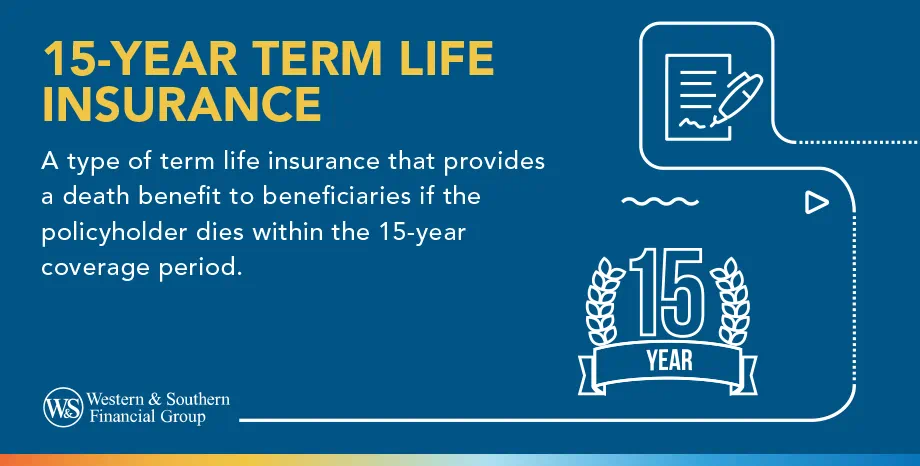

Table of Contents
Key Takeaways
- A 15-year term life insurance policy provides temporary coverage for a specific period and expires at the end of the term.
- Premiums for a 15-year term policy remain the same throughout the term.
- If the insured person dies during the term, beneficiaries receive the death benefit as long as premiums are up-to-date.
- A 15-year term policy suits those who want coverage until retirement or anticipate changing insurance needs in the near future.
- It can be suitable for individuals with a 15-year mortgage or to complement existing longer-term policies.
When you buy term life insurance, you should consider your needs and how long you want your coverage to last. A 15-year term life insurance policy is a popular option because of its affordability and usefulness for meeting several financial goals.
What Is a 15-Year Term Life Policy?
With a 15-year term life policy, you receive temporary life insurance coverage for a limited period of time. Once underwriting is completed, your policy goes into effect for a period of exactly 15 years. Unless you decide to renew or purchase additional coverage, your policy will expire at the end of this 15-year period.
How Does a 15-Year Term Life Policy Work?
Your insurance premium will stay the same the entire length of the term (15 years). If you were to die during this time, your beneficiaries would receive the death benefit, as long as your premiums are paid or up-to-date. After 15 years, however, your coverage will end.
When you buy term life insurance, the premium you pay depends on many factors. However, longer policies generally cost more, since they cover a greater amount of time. A 15-year term is approximately the midway point for both duration and cost of coverage.
Why Choose a 15-Year Policy?
Depending on your age, budget and specific life situation, a 15-year term life policy may be an ideal choice for you. Let’s consider a few different scenarios.
Getting Coverage Until You Retire
A 15-year term policy length could be a good fit for someone in their early 50s who is in good health and would like additional insurance coverage until they retire. Since most people in this age group have about 15 years until retirement, this term length could work well for meeting this goal. Your health could be an important factor in getting coverage, so keep this in mind when considering your insurance options.
Joe is a 56-year-old office manager who would like additional insurance coverage for this reason. He expects to work for another 12 years. With a 15-year policy, he'll have additional coverage for the rest of his career that would protect him and give his wife peace of mind if something were to happen to him.
Changing Needs in the Foreseeable Future
A 15-year term could also be useful if your insurance needs might change in the near future. Since this policy length generally costs less than longer-term policies, it may not cost as much to convert to a permanent coverage option. With longer policies, you could end up having overpaid if you convert too early on.
Having a 15-Year Mortgage
This type of policy could also work well when you buy a house with a 15-year mortgage, as the life insurance term overlaps with your home loan. You could even use a 15-year term life insurance policy to complement other, longer-lasting policies when you would like to add more coverage.
Increased Income & Older Children
Monica bought a 30-year term life policy when she had her first child 10 years ago. However, her income has gone up over the last decade, and now she would like more insurance coverage to protect her family. She only has a few more years until her son moves away for college, so she doesn't want another 30-year term policy. She could decide to add a less expensive 15-year term policy instead.
When Could a 15-Year Term Life Policy Be Less Suitable?
A 15-year term life insurance policy could be a good option for many scenarios. However, it might not be a suitable choice for long-term goals as a stand-alone policy. If you would like to secure protection for your new baby, for example, this term length will expire before your child comes of age.
It could also be a less ideal fit if you are in your 30s or 40s and are looking for a policy to cover you while you're in the working world. Depending on your age, your career will probably last longer than a 15-year term life policy. You might consider a longer term policy length if you would like an insurance policy that will cover you at least until retirement.
How Much Does a 15-Year Term Life Insurance Policy Cost?
A variety of factors — related to the specifics of the policy and how your personal information will affect the underwriting — go in to determining the cost of a 15-year term life insurance policy. These contributing factors include:
- Death benefit amount
- Policy Riders
- Age
- Gender
- Health
- Tobacco use
- Family history
- Lifestyle
- Occupation
Remember that your actual policy costs will be different, depending on your personal underwriting results.
Any Other 15-Year Term Life Considerations?
If you buy a 15-year term life insurance policy and are not sure whether it'll last long enough to cover your needs, you could consider setting up a guaranteed renewable policy. Pursuing this route, you could extend your coverage past 15 years without going through another medical exam.
Also, the premiums on 10- and 15-year term policies can be fairly close. Even if you think your insurance needs will only last 10 years, you could always consider upgrading to a 15-year term policy. You could build more of a safety net without paying much more per month.
It could also help to review your plan with a trained insurance professional before making a decision. Such a professional could help you calculate exactly how much insurance you need and determine the right length for your term life insurance. By considering this information — and after speaking with a financial representative — you could then decide whether you're a good candidate for 15-year term life insurance.
















